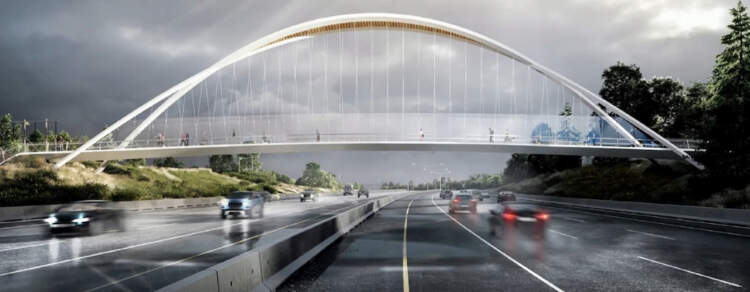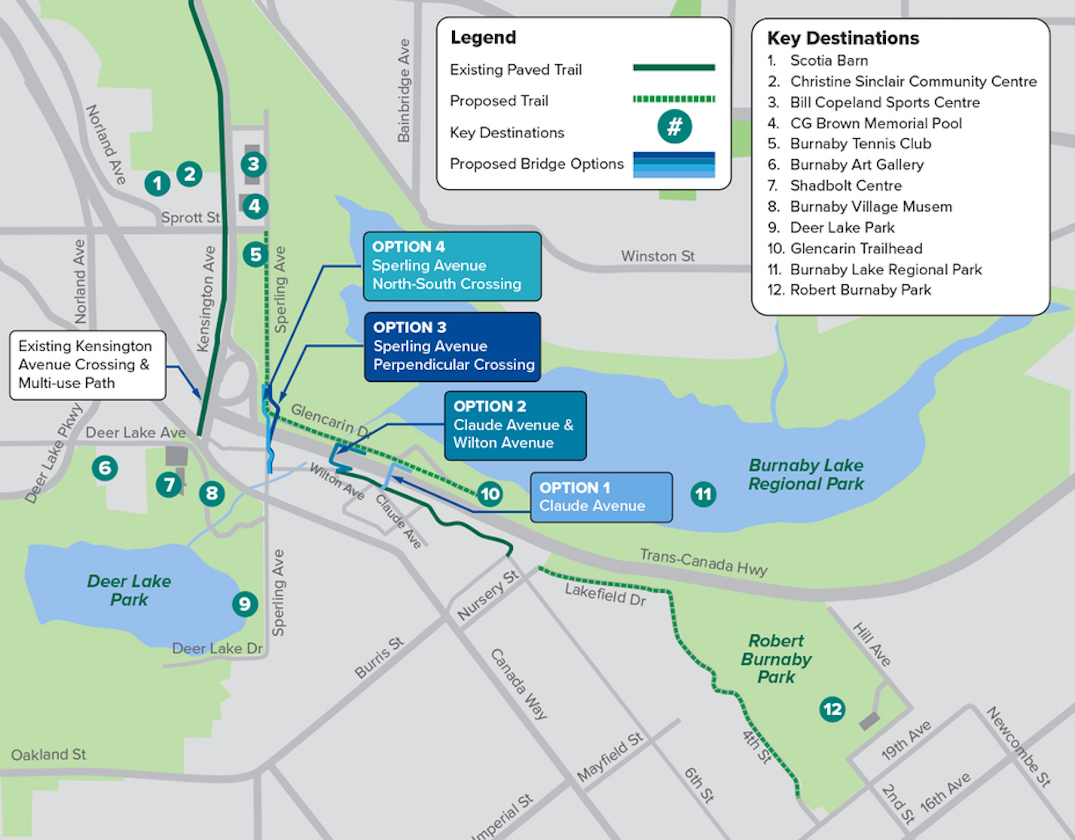
City Council Approved the Location for a New Pedestrian-Cyclist Overpass over Highway 1
The detailed design of the pedestrian and cyclist overpass will now proceed between Burnaby Lake and Deer Lake.
Sources: City of Burnaby, Daily Hive
On Monday, November 21st, Burnaby City Council approved the staff’s recommendation of supporting the first location-based bridge option, which would provide a seamless connection between both sides of the highway and the recreational trails.
The staff’s recommendation reflects public input received from this past spring’s consultation.
As the first option takes advantage of the high terrain on both sides of the highway, it has the lowest construction cost of $16 million, since it reduces both the size of the superstructure and the length of the ramps.
The first option is the easternmost of the four location-based options, located near Claude Avenue.

Map showing the four location options for the Highway 1 pedestrian and cyclist overpass between Burnaby Lake and Deer Lake. (City of Burnaby)
The new overpass will cross Highway 1 between Glencarin Drive and Claude Avenue, allowing residents, commuters, and visitors to cross safely and comfortably. In previous communications, this was referred to as Option 1.

Option 1: Artistic rendering of the pedestrian and cyclist overpass design across Highway 1 between Burnaby Lake and Deer Lake. (City of Burnaby)

Option 1: Artistic rendering of the pedestrian and cyclist overpass design across Highway 1 between Burnaby Lake and Deer Lake. (City of Burnaby)
The second option, just to the west of the first, is estimated to cost $19 million, while the other two, along Sperling Avenue, are estimated to cost $59 million each.
There are two options for Sperling Avenue, adjacent to the Kensington Avenue interchange on the highway, but they are challenged by the need for a larger bridge superstructure and foundation components, as well as the cost of BC Hydro utility relocation of more than $4 million.
A third and fourth option on Sperling Avenue are also not supported by the BC Ministry of Transportation, as they would limit the possibility of expanding Highway 1 in the future, such as a widening with two additional lanes or extending the on- and off-ramps at the nearby interchange.

Option 3: Artistic rendering of the pedestrian and cyclist overpass design across Highway 1 between Burnaby Lake and Deer Lake. (City of Burnaby)

Option 4: Artistic rendering of the pedestrian and cyclist overpass design across Highway 1 between Burnaby Lake and Deer Lake. (City of Burnaby)
Several city councilors expressed concerns about the location of the first option since some users would have to detour to reach the other side. In addition, all four location options are located within a 500-meter zone just east of Kensington Avenue.
Some councilors, however, noted that the westernmost options present accessibility challenges as well.
In addition to being the least expensive and shortest ramp, the first option has the least environmental impact, the least geotechnical and utility challenges, and does not require any jurisdictional consent.
Joe Keithley, a city councilor, specifically suggested that the lower cost of the first option could leave money for a future overpass further east.
The provincial and federal governments have agreed to jointly fund the project, contributing $6.87 million in total.
Construction on this grant needs to begin in 2023, which makes the case for supporting the simplest design.
To read more local news and updates please check our BLOG PAGE
To view Geoff Jarman’s Listings CLICK HERE

